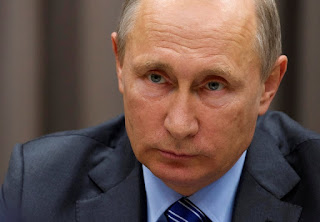Vladimir Putin’s Outlaw State
President Vladimir Putin is fast turning Russia into an outlaw nation. As one of five permanent members of the United Nations Security Council, his country shares a special responsibility to uphold international law. Yet, his behavior in Ukraine and Syria violates not only the rules intended to promote peace instead of conflict, but also common human decency.
This bitter truth was driven home twice on Wednesday. An investigative team led by the Netherlands concluded that the surface-to-air missile system that shot down a Malaysia Airlines plane over Ukraine in July 2014, killing 298 on board, was sent from Russia to Russian-backed separatists and returned to Russia the same night. Meanwhile, in Syria, Russian and Syrian warplanes knocked out two hospitals in the rebel-held sector of Aleppo as part of an assault that threatens the lives of 250,000 more people in a war that has already claimed some 500,000 Syrian lives.
Russia has tried hard to pin the blame for the airline crash on Ukraine. But the new report, produced by prosecutors from the Netherlands, Australia, Belgium, Malaysia and Ukraine, confirms earlier findings. It uses strict standards of evidence and meticulously documents not only the deployment of the Russian missile system that caused the disaster but also Moscow’s continuing cover-up.
Ukraine’s foreign minister, Pavlo Klimkin, told The Times last week that his government is determined to bring both Russia and the individuals who fired the missile to justice.
Some Western officials have accused Russia of war crimes, charges that could be pursued through international channels, even if Moscow blocks a formal referral to the International Criminal Court. New sanctions against Russia also should be considered. Mr. Putin will undoubtedly fight any such action, using his veto on the Security Council, but whatever his response, the United States should lend its support to Ukraine’s quest for accountability.
There seems no holding Mr. Putin to account in Syria. For months he has pretended to negotiate on a political solution to a five-year-old civil war between his client, President Bashar al-Assad, and rebels backed by the United States and some Arab nations. But despite pleas from Secretary of State John Kerry, who has spent an enormous amount of time and effort negotiating two separate (and short-lived) cease-fires, Russian and Syrian forces, backed by Iranian ground troops, have continued the slaughter.
Over recent days, Mr. Putin has again shown his true colors with air attacks that have included powerful bunker-busting bombs that can destroy underground hospitals and safety zones where civilians seek shelter. On Sept. 19, Russia bombed an aid convoy, which like hospitals and civilians are not supposed to be targeted under international law.
On Wednesday, Mr. Kerry threatened to withdraw an American team from Geneva where the two sides had established a center to collaborate on a cease-fire. But that is likely to have little effect, and Mr. Kerry has few, if any, diplomatic cards to play.
President Obama has long refused to approve direct military intervention in Syria. And Mr. Putin may be assuming that Mr. Obama is unlikely to confront Russia in his final months and with an American election season in full swing. But with the rebel stronghold in Aleppo under threat of falling to the government, administration officials said that such a response is again under consideration.
Mr. Putin fancies himself a man on a mission to restore Russia to greatness. Russia could indeed be a great force for good. Yet his unconscionable behavior — butchering civilians in Syria and Ukraine, annexing Crimea, computer-hacking American government agencies, crushing dissent at home — suggests that the furthest thing from his mind is becoming a constructive partner in the search for peace.




